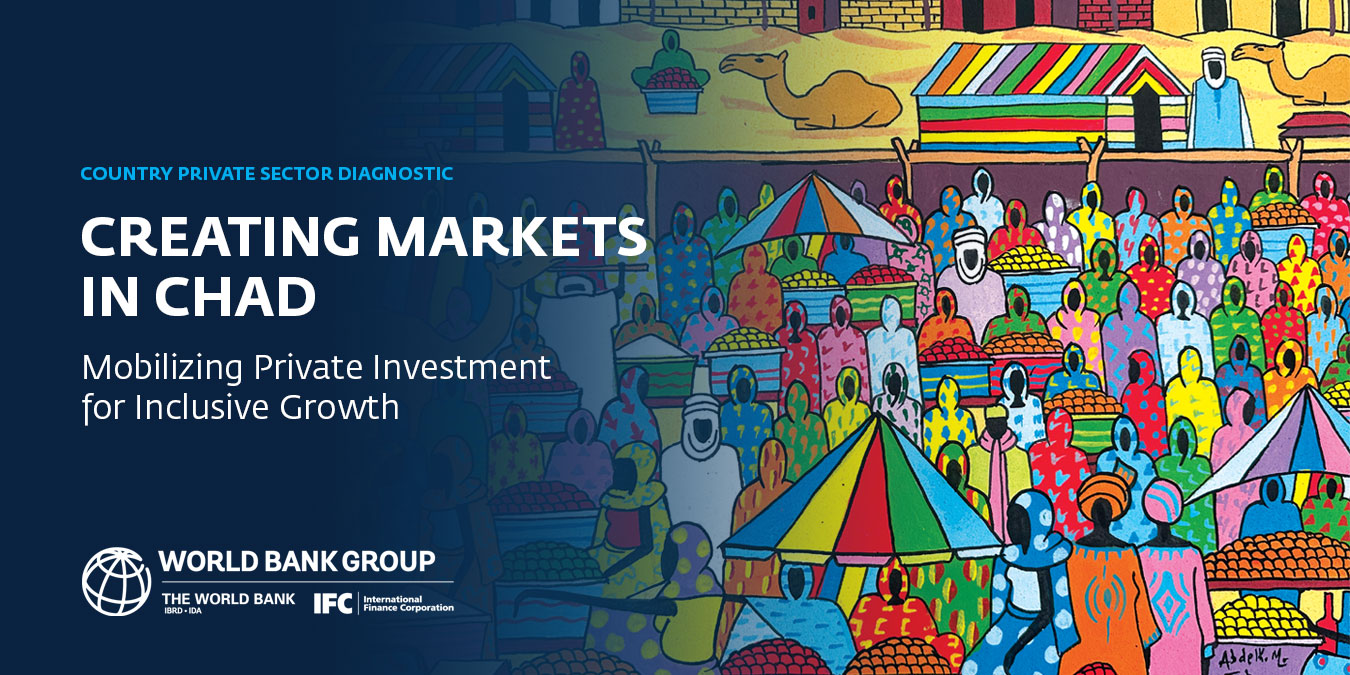
N'Djamena, Chad, March 27, 2023 — Chad can diversify its economy, reduce poverty, and spur inclusive development by increasing private sector investment in high-growth agriculture value chains and in the energy, infrastructure, and access to finance sectors that support crop and livestock development, according to a report published today by IFC and the World Bank.
The Chad Country Private Sector Diagnostic (CPSD) analyzes private sector challenges and opportunities in Chad, identifies areas for reform, and highlights sectors with the greatest potential to drive sustainable and inclusive private sector–led growth in alignment with Chad's development agenda In Vision 2030: The Chad We Want.
The CPSD highlights livestock, sesame seed, gum arabic, and cotton as value chains with high potential for development impact. Increasing private participation in cold-chain infrastructure, industrial-scale breeding, and water management, along with support to farmers to help them access quality seeds and fertilizers, will also boost agricultural development, according to the report.
The report comes as Chad, an increasingly oil-dependent economy, continues to recover from the impacts of the COVID-19 pandemic while facing other significant challenges, including food insecurity, oil price volatility, and climate change. Agriculture and pastoralism account for 73 percent of household income and 54 percent of GDP.
"Chad aspires to diversify its economy in order to achieve the promises of its national development plan. Through the CPSD, the World Bank and IFC intend to support the Government of Chad's efforts to make the private sector the engine of job creation and economic transformation," said Rasit Pertev, World Bank Country Manager for Chad.
"Chad boasts considerable opportunities for private sector investment in agriculture value chains that can drive structural transformation and job creation," said Sylvain Kakou, IFC Country Manager for Chad. "The CPSD explores in detail how Chad can better harness its agricultural resource endowments to generate more economic opportunities and reach its development goals".
The report also underscores the need for Chad to implement reforms to remove constraints in energy, infrastructure, access to finance, and the digital economy, which are hindering the country's agriculture sector. For example, establishing mini-grids and independent power plants and providing credit guarantees for SME's could boost farmers' and producers' productivity.
In line with the CPSD's findings, the World Bank Group's strategy for Chad focuses on agribusiness, infrastructure, power, ICT, manufacturing, transport, and logistics.
The Chad CPSD can be downloaded here in French and English.
About the Country Private Sector Diagnostic
Launched in 2017 as a corporate priority, the World Bank Group's Country Private Sector Diagnostics support the institution's strategic focus on expanding private investment and leveraging private solutions to address development challenges in client countries. The diagnostics assess critical constraints to private sector engagement and identify policy and regulatory reforms needed to unleash private sector growth. They are jointly delivered by IFC and the World Bank. For more information, visit www.ifc.org/cpsd.
About IFC
IFC—a member of the World Bank Group—is the largest global development institution focused on the private sector in emerging markets. We work in more than 100 countries, using our capital, expertise, and influence to create markets and opportunities in developing countries. In fiscal year 2022, IFC committed a record $32.8 billion to private companies and financial institutions in developing countries, leveraging the power of the private sector to end extreme poverty and boost shared prosperity as economies grapple with the impacts of global compounding crises. For more information, visit www.ifc.org.
About the World Bank Group
The World Bank Group plays a key role in the global effort to end extreme poverty and boost shared prosperity. It consists of five institutions: the World Bank, including the International Bank for Reconstruction and Development (IBRD) and the International Development Association (IDA); the International Finance Corporation (IFC); the Multilateral Investment Guarantee Agency (MIGA); and the International Centre for Settlement of Investment Disputes (ICSID). Working together in more than 100 countries, these institutions provide financing, advice, and other solutions that enable countries to address the most urgent challenges of development. For more information, please visit www.worldbank.org, www.miga.org, and www.ifc.org.
Stay Connected
Contacts
For IFC:
Abdoul Maiga
Phone: + 1 (202) 967 8969
E-mail: amaiga7@ifc.org
For the World Bank:
Nako Madjiasra
E-mail: nmadjiasra@worldbankgroup.org
Stay Informed
Sign up to have customizable news & updates sent to you.